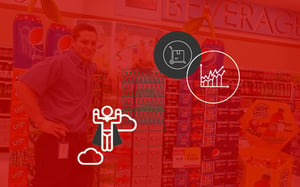There are no two ways about it. The average merchandiser doesn’t get the credit they deserve. And it needs to stop right away. Why? It’s because they do far more good for your stores than you think. In fact, there is even a case to be made to describe merchandisers as the unsung heroes of retail.
If you think we're overly sentimental or melodramatic here, we're most certainly not. We’re merely stating the facts. And we can back it up by giving you a few reasons, which we dive into below.
A merchandiser is an unsung hero because s/he is not just a shelf packer
You can argue that merchandisers are nothing more than shelf packers. And, you'd be correct. But, by describing them as so, you’re doing them a disservice since you’re viewing them through a narrow lens.
Yes, they are shelf packers, but they are also customer facing.
For example, from the perspective of your customer, they’re heroes because they can make the shopper experience that much more pleasant. Let’s say you’re a customer who walks into a store. You know that when you walk in, you’re not going to seek out the manager to ask them where to find a particular product if it’s not on the shelf. You’re also unlikely to see a sales representative at the end of any aisle or gondola waiting for you to ask them a question.
Instead, you’ll look for the nearest in-store merchandiser who is packing the shelf. And they’ll know where to find the product you want. The fact that they’ll know makes them an untapped asset to your store. Not just as a shelf packer, but as an extra, albeit informal, sales representative. Your merchandising team can be the difference between an excellent and disappointing in-store experience.
A merchandiser is an unsung hero because s/he implements your planograms
While we have established the fact that a merchandiser is more than a shelf packer, it’s still essential to address their primary role.
There is so much more to the act of packing a shelf than placing a product in the right place. Of course, it’s not a complicated job. We’re certainly not saying that it is. But it does take time and it makes a difference.
If you have ever implemented a planogram in-store, you’ll know that it’s tedious work. It requires many hands and merchandisers need to work long hours to get the job done right. That’s especially true if you're opening a new store and the deadline to complete it is tight. Or, if new planograms have been created and sent to your stores and the shelves need to be repacked overnight.
The fact that it's also mostly done behind the scenes means its almost understandable if you overlook the work of a merchandiser. That doesn't make it acceptable, though. You'll also soon notice when they don't do their job. Your shelves will be empty and your customers frustrated and unhappy. More than that, you’ll lose out on any potential sales opportunities.
In that sense, then, if your shelf packers are unsung heroes to your customers, you can view them as unsung heroes for your business as well.
Let’s use a simple battle analogy to explain. If your store manager is the general, the merchandisers are your foot soldiers. While the general implements the strategies and takes most of the credit when everything goes according to plan, we all know that it’s the foot soldiers who ultimately win you the war.
A merchandiser is an unsung hero because s/he is your ears and eyes on the floor
Together with the role of implementing a planogram at store level, as a merchandiser, you have to ensure the proper maintenance of the shelf. Again, it’s a tedious job. Maintaining planogram compliance usually is. But that doesn’t mean that it’s not of value, and shelf planners shouldn’t be taken for granted.
As we’ve mentioned above, an empty shelf can put a shopper off to the point that they don’t return. Thus, looking after the visual aspect of the shelf - keeping it stocked adequately - is essential. That said, you can also go one step further.
By that, we mean merchandisers can be a retailer’s ears and eyes on the floor. In fact, merchandisers are, regardless of whether that’s acknowledged or not. After all, a store manager can’t be everywhere all the time.
Since merchandisers implement planograms, they will have hopefully been taught about how to read one and understand it. Even at a fundamental level. Then, in future, they could look at a planogram, and pick up if something isn’t right. For example, while a planogram might appear correct according to the data that was plugged in, there could be a problem with the data, or there could be unforeseen additional demand so that you continually run out of stock of certain products.
A merchandiser could pick this up if they know to look out for it. They could even spot consistent trends, or listen to customers who share with them information about what products they’d like to see on the shelf, and then take action. That could include telling you or your merchandising manager about it so that a plan be put in place for the future.
By the way, this is over and above the usual maintenance work that they usually do, which includes lining up products and ensuring shelves don’t appear empty.
Conclusion
The role that merchandisers play in the retail industry is often overlooked and underappreciated. But why should that be? Why should they be ignored? They are a vital cog in the machine that is your store. And without them, your store would be poorer for it.


